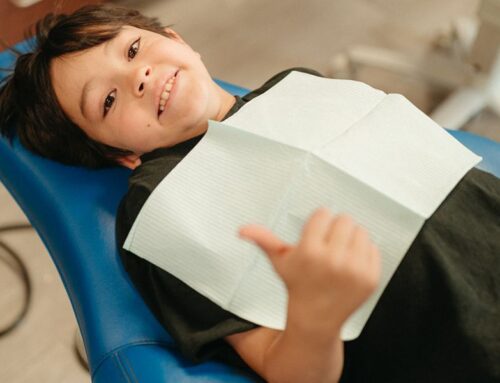
 One of the best ways to prevent cavities and promote your child’s overall health is to make sure they have a balanced diet, including one serving each of fruits and vegetables, breads and grains, milk and dairy products, and meat/fish/beans/eggs. A healthy & balanced diet naturally supplies all of the nutrients that your child needs to grow and develop and is required for your child’s teeth to develop properly and have healthy surrounding gums.
One of the best ways to prevent cavities and promote your child’s overall health is to make sure they have a balanced diet, including one serving each of fruits and vegetables, breads and grains, milk and dairy products, and meat/fish/beans/eggs. A healthy & balanced diet naturally supplies all of the nutrients that your child needs to grow and develop and is required for your child’s teeth to develop properly and have healthy surrounding gums.
Limiting the number of servings of sugars and starches will help protect your child’s teeth from decay. A wide variety of foods contain one or more types of sugar and all sugars can promote cavities. Aside from the obvious sources of sugar such as candy and soda, foods with starches/sugars include breads, crackers, pastas, and snacks such as pretzels and potato chips. Sugars can be found in fruits, some vegetables, milk/milk products, jelly/jam, ketchup, and many other foods & snacks that children love. Sticky foods such as dried fruit & fruit snacks or foods that stick to the teeth are not as easily washed away by saliva and increase your child’s risk of getting cavities.
Foods with sugar and starches are safer for teeth when eaten as part of a meal as opposed to as a snack. Do not nurse a young child to sleep or put them to bed with a bottle of milk, formula, juice, or any sweetened liquid. We recommend not giving your child anything other than water after having brushed their teeth before bed. When kids sip sugary drinks for extended periods, they’re exposed to a higher risk of cavities. Water is the best beverage for your child’s teeth. Sippy cups should only contain water unless it’s mealtime.
To help parents reduce the risk of cavities in children, the American Academy of Pediatric Dentistry offers parents the following guidelines on using sippy cups properly:
- The sippy cup is a training tool to help children transition from a bottle to a cup. It shouldn’t be used for a long period of time – it’s not a bottle and it’s not a pacifier.
- Unless being used at mealtime, the sippy cup should only be filled with water. Frequent drinking of any other liquid, even if diluted, from a bottle or no-spill training cup should be avoided.
- Sippy cups should not be used at naptime or bedtime unless they only have water in them.
Foods That Are Good For Your Child’s Teeth
Cheese
Recent research shows cheese is one of the healthiest snacks for your child’s teeth. In addition to providing large amounts of much-needed calcium, cheese also does its part to fight cavities. Cheddar, swiss, mozzarella, and monterey jack all stimulate the body’s salivary glands to clear the mouth of debris and protect teeth from acids that weaken them. This means cheese disrupts the development of cavities, especially when eaten as a snack or at the end of a meal. Calcium and phosphorous found in cheese reduce or prevent decreases in the plaque’s pH level and work to re-mineralize the enamel of your child’s teeth. In addition, milk and plain yogurt are good foods for children to eat. Milk, and other dairy products such as cheese and yogurt, are low in sugar, which is a good thing for your dental health. Plus, they contain protein in addition to calcium, which can help strengthen your teeth. Phosphorus-rich foods such as meat, poultry, fish, milk and eggs help to strengthen your teeth and also contain valuable protein.
Fruits & Veggies
Fruits and veggies are an important part of any balanced diet, and they are also good for your teeth. Since they are high in water and fiber, they help to balance the sugars they contain and help to clean your teeth. Chewing also helps to stimulate saliva production, which washes harmful acids and food particles away from your teeth.
Nuts
Nuts contain protein and minerals important for overall health. In addition, nuts that are low in carbohydrates don’t add to your risk of cavities. Why? Because tooth decay is caused by acid-producing bacteria that are activated by carbohydrates. Another benefit is that chewing nuts also stimulates saliva production, which helps reduce your risk for tooth decay.
Foods Not Good For Your Child’s Teeth
The truth is that frequent exposures to acidic foods can erode enamel, making teeth more susceptible to decay over time. So even though a squeeze of lemon or lime can turn a simple glass of water into a fun beverage, it’s not always the best choice for your mouth. Citric fruits and juices can also irritate mouth sores. Make sure to drink plenty of plain water.
When it comes to picking healthy snacks, many people put dried fruit at the top of the list. But many dried fruits are sticky. Sticky foods can damage your teeth since they tend to stay on the teeth longer than other types of food and thus increase the amount of time that cavities can form. If you find yourself eating dried fruits or trail mix often, make sure to rinse with water as well as to brush and floss after.
Who doesn’t love the nice, satisfying crunch of a potato chip? Unfortunately potato chips are filled with starch, which tends to get trapped in between and on your teeth. If you eat snacks like these, take extra care when you floss to remove all the food particles that can lead to plaque build-up & cavities.
When you eat sugary foods or sip sugary drinks for long periods of time, bacteria in your mouth and in plaque on the teeth use that sugar to produce acids that attack & eat away your enamel (the hard & protective outer surface of your teeth.) Most carbonated soft drinks, including diet soda, are acidic and therefore, bad for your teeth. Caffeinated beverages, such as colas, can also dry out your mouth thus preventing saliva from protecting your teeth and washing away harmful acids and food debris. If your child does consume soft drinks, try to drink/swish water while drinking the soda and brush afterwards.
Sugar is also a main ingredient for many sports and energy drinks including Gatorade. The American Academy of Pediatrics says sports drinks can be helpful for young athletes engaged in prolonged, vigorous physical activities, but unnecessary in most cases. Before buying and consuming sports and energy drinks, check the label to make sure your drink of choice is low in sugar or simply drink plenty of water.
To summarize, healthy foods that don’t cause cavities include crunchy and leafy vegetables, cheese, nuts, meats, fats, eggs, and water. Foods that can cause cavities with a moderate amount of risk are whole milk, fresh fruit, whole grain bread, popcorn, smoothies, dark chocolate (>70% cocoa), yogurt, dips & sauces, and oatmeal. Foods that easily cause cavities include candy, soda, juice, chocolate milk, cookies, dried fruit, fruit snacks, pretzels/crackers/chips, oranges, bananas, and sports drinks.
(Citation: American Academy of Pediatric Dentistry, ADA, Delta Dental, The Dentist Dad)
Contact
Phone | (775) 376-7914
Email | info@salafamilydentistry.com
Hours
| Mon - Fri | 7:00am – 5:00pm |
| Saturday | 7:00am - 3:00pm |
| Sunday | Closed |
Location





